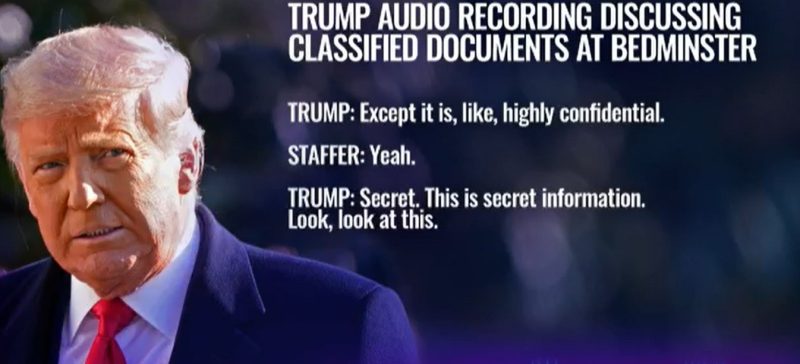KEY PIECE OF EVIDENCE OBTAINED BY CNN: TRUMP’S CONFESSION

An audio recording, from July 2021 at his Bedminster golf club features former President Trump, where he appears to acknowledge retaining a classified Pentagon document concerning a potential attack on Iran, has been unearthed by CNN.
A Critical Piece of Evidence
The meeting took place in Bedminster, New Jersey, and the recording aired first on CNN’s “Anderson Cooper 360.” The conversation has become a crucial piece of evidence in Special Counsel Jack Smith’s indictment of Trump over alleged mishandling of classified information.
At one point during the conversation, Trump seems to indicate he was in possession of a classified Pentagon document detailing plans for a potential attack on Iran. He mentions, “These are the papers,” a quote that surprisingly did not appear in the indictment.
Contradicting Statements
The recording also features Trump and his aides joking about Hillary Clinton’s private emails after he refers to the document as “secret information”. This humor-filled banter stands in stark contrast to Trump’s previous assertions during an interview with Fox News’ Bret Baier, where he claimed not to have any such documents in his possession.
In the Fox News interview, Trump insisted, “There was no document. That was a massive amount of papers and everything else talking about Iran and other things.” He continued, “And it may have been held up or may not, but that was not a document. I didn’t have a document, per se. There was nothing to declassify. These were newspaper stories, magazine stories, and articles”.
Allegations and Legal Proceedings
Trump pleaded not guilty earlier to 37 counts related to the alleged mishandling of classified documents kept at his Mar-a-Lago resort in Palm Beach, Florida.

The audio recording originated from an interview that Trump gave in July 2021 at his Bedminster resort for those working on the memoir of Mark Meadows, Trump’s former chief of staff.
The special counsel’s indictment alleges that those in attendance, including a writer, publisher, and two of Trump’s staff members, were shown classified information about the plan of attack on Iran.
In the indictment, prosecutors reference two separate incidents where they allege that Trump showed classified information to individuals who lacked security clearances. CNN had previously reported that Trump was furious over a New Yorker article that stated General Mark Milley, Chairman of the Joint Chiefs, argued against striking Iran due to concerns that Trump could instigate a full-scale conflict.
Despite these allegations, a Trump campaign spokesman, Steven Cheung, issued a statement saying, “The audio tape provides context proving, once again, that President Trump did nothing wrong at all”.
From a legal perspective, the allegations levelled against Trump are grave and carry significant consequences if proven true. If the special counsel’s indictment holds up in court, it could lead to serious repercussions for the former president, including potential fines, loss of privileges, and even imprisonment. This case underscores the gravity of handling classified information and the stringent measures in place to prevent any potential breaches.
Moreover, the indictment alleges two instances where Trump revealed classified information to individuals lacking the necessary security clearances. If substantiated, these allegations could seriously undermine the former president’s assertions of innocence and paint a picture of careless disregard for the security protocols surrounding classified information.
Political Ramifications
The political ramifications of these allegations are equally significant. This case has the potential to significantly influence public opinion about Trump’s tenure as president and his handling of national security matters. The revelation of the audio recording could significantly impact his future political prospects, particularly if he intends to run for public office again.
Furthermore, the case highlights the crucial role of oversight in maintaining the integrity of government institutions and processes. It underscores the need for continuous vigilance in ensuring that individuals in positions of power are held accountable for their actions, particularly when it comes to handling sensitive information that could potentially impact national security.
Reflection on National Security Protocols
This case necessitates a thorough reflection on the protocols in place for handling classified information, particularly by individuals in the highest echelons of power. It raises important questions about whether existing procedures and protocols are sufficient to prevent potential breaches of classified information.
Moreover, it brings to the forefront the issue of whether more stringent measures need to be implemented to ensure that individuals who have access to such information fully understand the gravity of their responsibilities and the potential consequences of mishandling such documents.
Meanwhile, Trump’s defense maintains that the audio recording provides context that substantiates his innocence. Trump campaign spokesman Steven Cheung said in a statement that “the audio tape provides context proving, once again, that President Trump did nothing wrong at all”. They argue that the recording does not definitively prove that Trump mishandled classified information, and that any allegations of such are merely speculative and lack substantive proof.
Future Implications
The final adjudication of this case will inevitably have lasting implications for future presidencies and the handling of classified information. It has the potential to set a precedent for how such matters are handled legally and politically, potentially influencing future policies and protocols related to the handling of classified information.
Regardless of the outcome, this case serves as a potent reminder of the immense responsibility that comes with holding office and having access to sensitive, classified information. It highlights the need for stringent protocols, vigilant oversight, and the utmost care and discretion in handling such information.
The controversy surrounding the audio recording of the 2021 conversation in which former President Donald Trump acknowledges holding onto a classified Pentagon document about a potential attack on Iran is multifaceted and far-reaching. From legal implications to political ramifications, from public perception to national security protocols, this case touches on multiple spheres of national importance.
Whether the claims of mishandling classified documents will hold up in court, and what the long-term implications of this case will be, remains to be seen. What is clear, however, is that this case has brought to the forefront critical conversations about the handling of classified information, the responsibilities of those in power, and the importance of transparency and accountability in our institutions.
